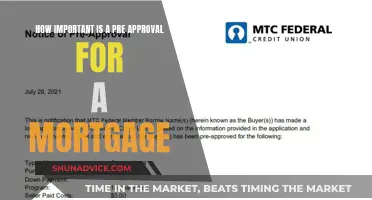
Deciding between a cash offer and a mortgage is one of the biggest choices in the home-buying process. A cash offer means the buyer has the funds to purchase the home outright without needing a loan, while a mortgage is a loan from a lender that the buyer pays back over time, often with monthly payments that include interest. Cash offers are straightforward and quick, while mortgages require a lengthy approval process. Cash offers also provide more certainty that the deal will close successfully, but they are typically lower than traditional mortgage offers. Both options have their pros and cons, and the best choice depends on the buyer's financial priorities and the seller's desired price and timeline.
All Cash Offer vs Mortgage
| Characteristics | All Cash Offer | Mortgage |
|---|---|---|
| Buyer's financial instrument | Liquid funds | Loan from a lender |
| Buyer's payment method | Direct payment | Monthly payments with interest |
| Closing timeline | Faster | Longer |
| Certainty of closing | Higher | Lower |
| Contingencies | None | Loan approval, financing contingencies |
| Tax implications | Fewer | More |
| Buyer's financial flexibility | Lower | Higher |
| Seller's preference | Favored | Less favored |
What You'll Learn

All-cash offers are more likely to be accepted by sellers
Secondly, all-cash offers often result in a faster closing process. Without the need to wait for lender underwriting and approval, the sale can proceed more quickly, benefiting sellers who are in a hurry to complete the transaction. This speed also reduces the chances of last-minute issues or changes that could potentially delay or complicate the sale.
Additionally, all-cash offers provide flexibility for both buyers and sellers. Buyers with all-cash offers may be able to negotiate a lower purchase price, particularly if the seller is motivated by a quick sale. Sellers may be willing to accept a lower cash offer to avoid the potential delays and uncertainties associated with mortgage-backed buyers. This flexibility can be advantageous for both parties, allowing them to reach an agreement that meets their respective needs and priorities.
While all-cash offers have significant benefits, it is important to consider the potential drawbacks. For example, accepting an all-cash offer may result in a lower final sale price compared to a traditional mortgage offer. Additionally, some sellers may prefer the long-term financial benefits of taking out a low-interest mortgage, allowing them to invest their money elsewhere. Therefore, when considering an all-cash offer, sellers should carefully evaluate their priorities, such as their desired price, timeline, and financial goals, to determine the best option for their specific circumstances.
Understanding Mortgage and Debt: Key Differences Explained
You may want to see also

Cash offers are less likely to fall through
Another advantage of cash offers is that they usually do not require an appraisal, avoiding potential issues if the home's appraisal value falls below the agreed-upon price. Cash buyers also tend to have fewer contingencies in their offers, reducing potential obstacles to closing the deal. For example, they may be less likely to request a home inspection, as they are already putting out substantial cash and may not want a property that requires significant upgrades or repairs.
Cash buyers can also easily verify their ability to purchase by providing proof of funds, giving sellers confidence in the buyer's financial capability. There is no risk of the buyer losing their loan approval due to changes in their financial situation or credit score, which can happen with mortgage-backed buyers.
Overall, cash offers provide a streamlined and efficient selling experience, making them attractive to sellers seeking speed, security, and simplicity. However, it is important to note that cash offers may not always result in the highest possible selling price, and sellers should carefully weigh the benefits of a faster and more secure transaction against the potential for a higher selling price through a traditional sale.
Understanding Mortgage Estimation: Key Factors and Calculations
You may want to see also

Cash offers are usually lower than mortgage offers
Cash buyers can also avoid some fees tied to mortgages, such as lender origination fees or appraisal fees, which can save them tens of thousands of dollars in the long term. They can also avoid interest payments, which can add up over time.
In addition, cash buyers can often close the deal in a matter of days, making them an excellent choice for sellers looking for a quick and hassle-free transaction. However, if a seller has the time and wants to get the highest price possible for their property, they might be better off waiting for a buyer who is financing the purchase with a mortgage.
It's also worth noting that cash buyers come from a variety of backgrounds and may include real estate investors, house flippers, iBuyers (companies that pay cash for homes), or individuals with equity from a prior home sale. The category of routine cash buyers includes those who have bought numerous houses with cash before, and the transaction may go more smoothly with them than with a first-time cash buyer.
The Intricacies of Perfecting a Mortgage: Understanding the Process
You may want to see also

Cash offers have a faster closing timeline
When it comes to buying a house, there are two main ways to go about it: taking out a mortgage or making an all-cash offer. While both options have their pros and cons, one of the most significant differences is the closing timeline. Cash offers generally have a faster closing timeline than mortgage-backed offers, and this can be a deciding factor for both buyers and sellers.
For buyers, a cash offer can be advantageous if they are looking to secure a property quickly, especially in a competitive market. With a cash offer, there is no need to wait for loan approval or deal with financing contingencies, which can speed up the process by several weeks or even months. This is because a cash offer is straightforward and does not involve the same level of paperwork and approvals as a mortgage. A cash buyer can skip the home appraisal, income verification, and other steps related to obtaining a mortgage, which can save a significant amount of time.
Sellers also often prefer cash offers because they are more likely to close quickly and are less likely to fall through. In a competitive market, a seller may receive multiple offers, and a cash offer can stand out as it is seen as more reliable. There is no risk of the financing falling through, and the seller can avoid the potential delays associated with mortgage-backed offers, such as the lengthy underwriting and approval process.
Additionally, cash offers can provide more flexibility for both buyers and sellers. A buyer with liquid funds may be in a better position to negotiate and make a deal that works for both parties. Sellers, on the other hand, may be more willing to accept a lower cash offer because of the increased likelihood of a quick and successful transaction.
Overall, cash offers have a faster closing timeline than mortgage-backed offers, and this can be a significant advantage for both buyers and sellers, depending on their priorities and timelines. While a mortgage may offer more financial flexibility, a cash offer can be the preferred option when speed and simplicity are the main concerns.
The Mortgage Appraisal Process: How It's Done
You may want to see also

Buyers with bad credit can still be approved for a mortgage
A cash offer is when a buyer has the funds to purchase a home outright without needing a loan. On the other hand, a mortgage is a loan from a lender that the buyer pays back over time, often with monthly payments that include interest. Cash offers are straightforward and quick as there is no waiting for loan approval.
While a low credit score can make it harder to qualify for a mortgage, it does not make it impossible. Here are some ways buyers with bad credit can still be approved for a mortgage:
- FHA Loans: These are loans backed by the Federal Housing Administration and are attractive to first-time home buyers due to their lower qualifying requirements. The minimum credit score needed for an FHA loan is typically 580, but some lenders offer FHA loans with a minimum score of 500, which will require a down payment of 10%. FHA loans also have additional qualification requirements, such as only being able to purchase a primary residence.
- VA Loans: If you are a veteran, currently serving in the military, or the surviving spouse of a veteran, you may qualify for a VA loan. These loans are backed by the Department of Veterans Affairs and have less stringent credit guidelines.
- Non-Conforming Loans: These loans tend to be more expensive due to higher interest rates and can be harder to find. However, they may be an option for buyers with poor credit.
- Fannie Mae HomeReady Mortgages: These mortgages are designed to make homeownership more accessible, with a low down payment requirement of 3% and cancelable mortgage insurance. To qualify, you need a credit score of 620, although borrowers with non-traditional credit are also eligible.
- Freddie Mac Home Possible Loans: Similar to Fannie Mae HomeReady loans, these loans offer a 3% down payment requirement and more flexible credit requirements. To qualify, you must make no more than 80% of the area median income.
- Co-Signer: Getting a non-occupant co-signer with a better credit score can help you get approved for a mortgage loan.
- Large Down Payment: With a large down payment, it is possible to get a home loan with bad credit. A strong debt ratio or a history of timely payments can also help.
Mortgage Borrowing: When Is It Too Much?
You may want to see also
Frequently asked questions
An all-cash offer means the buyer has the funds to purchase the home outright without needing a loan.
A mortgage is a loan from a lender that helps the buyer finance the home over time, often with monthly payments that include interest.
All-cash offers provide a faster, more certain closing process for the seller, while a mortgage-contingent offer typically takes longer and carries more risk of falling through due to financing issues.
Yes, cash-offer financing programs give buyers who need mortgages the ability to make cash offers on homes.







